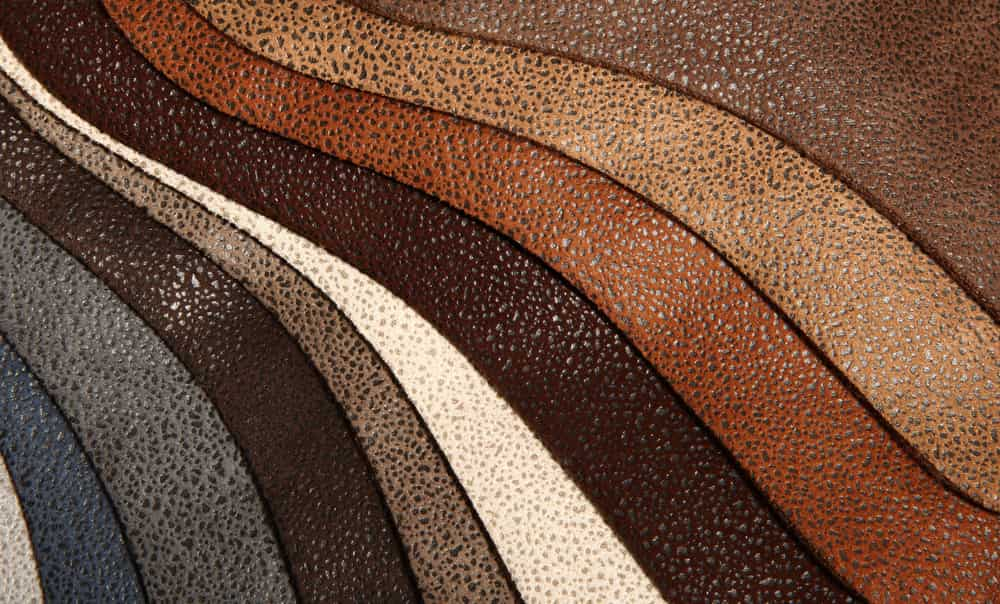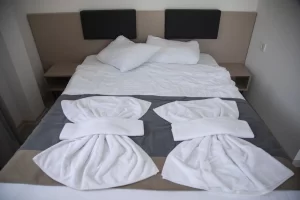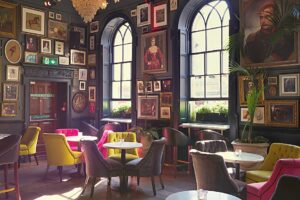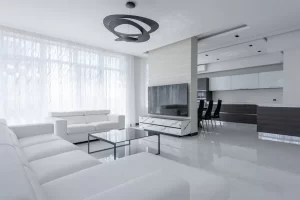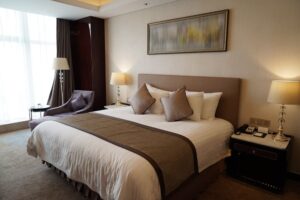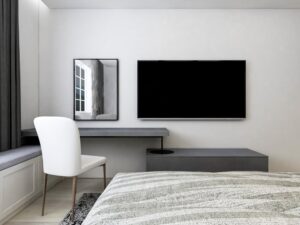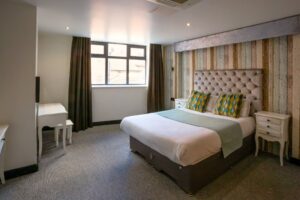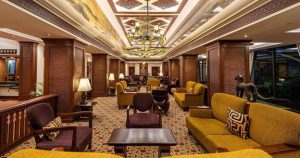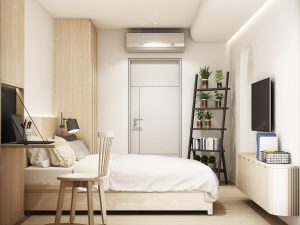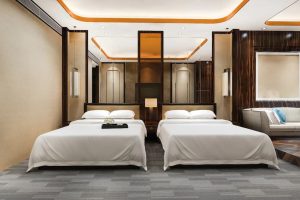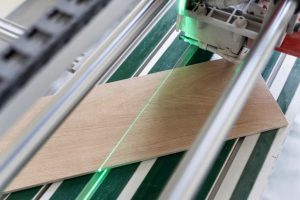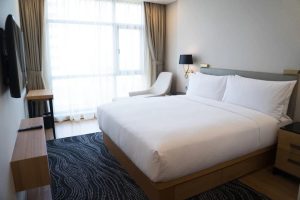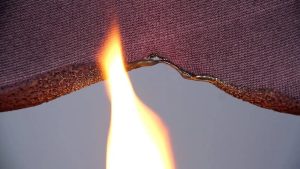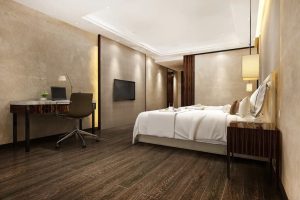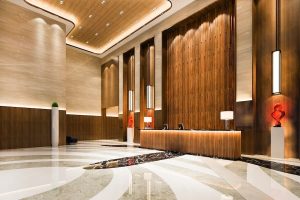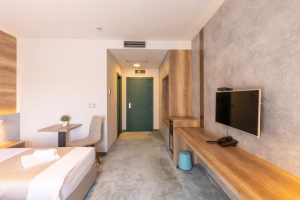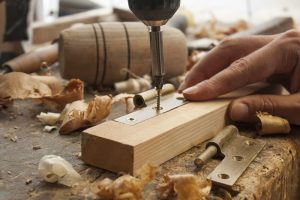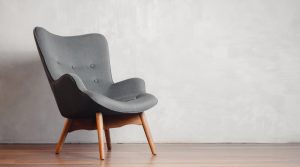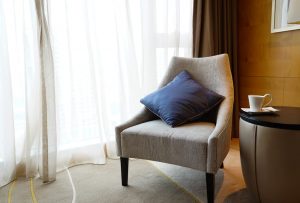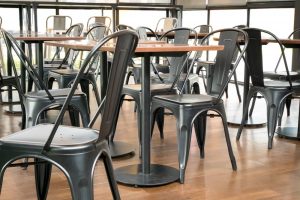Faux leather has gained popularity as a cost-effective, eco-friendly alternative to genuine leather. But what makes a good faux leather stand out? The quality of faux leather depends on several factors, including durability, texture, breathability, and environmental impact. Whether used for hotel furniture, upholstery, fashion, or automotive seating, selecting the best faux leather material ensures long-lasting beauty and functionality.
Understanding the differences between high-quality faux leather and cheap alternatives helps in making better purchasing decisions. In this guide, we explore the key characteristics of good faux leather and what to look for when choosing the best option.
Table of Contents
Toggle- Key Factors That Define High-Quality Faux Leather
- The Look and Feel of Premium Faux Leather
- Environmental Impact and Maintenance of Faux Leather
- How to Identify High-Quality Faux Leather
- The Advantages of Custom Luxury Hotel Furniture
- The Importance of Custom Hotel Furniture in Enhancing Guest Experience
- The Ultimate Guide to Finding Top Hotel Furniture Suppliers in Turkey
- Importance of High Quality Furniture in Hotels
- The Impact of Furniture Design on Hotel Guest Experience
- High Quality Furniture in Hotels: Essential for Guests
- The Role of Furniture in Defining Hotel Aesthetics
- The Evolution of Hotel Furniture Design Over the Years
- How to Choose the Right Upholstery for Hotel Furniture
- The Impact of Furniture Design on Guest Experience in Hotels
- Hotel Furniture and Design: Enhancing the Guest Experience
- Premium Hotel Furniture in Turkey: Elevate Your Hotel’s Interior Design
- How Do Hotels Get Furniture in the Rooms | Hotel Solutions
- Hotel Furniture Concept | Perfect Products for Your Hotel
- Top 5 Benefits of Turkish Made Hotel Furniture
- Furnishing an Apartment: 6 Tips for Choosing the Best Furniture
- Types Of Hotel Furniture You Need
- Why Turkish Made Hotel Furniture is the Best Choice for Your Business
- What is fixed furniture?
- Maximizing Your Hotels ROI with High-Quality Furniture Solutions
- Benefits of Custom Made Furniture
- Hotel Furniture Buying Guide
- Where do I buy hotel furniture in Turkey?
- How to make a hotel room feel like home
- How Often Do Hotels Change Their Interiors?
- A good hotel furniture manufacturer
- 7 signs your that hotel needs renovation
- What factors will affect hotel furniture prices?
- Should I Buy Laminate or Veneer Furniture?
- MDF cutting machine
- What are the Basic Furniture Required to Set Up a Hotel?
- What is Crib 5?
- Four Ways to Maintain Hotel Room Storage
- Characteristics of a Custom Hotel Furniture
- Popular Materials for Luxury Hotel Furniture Manufacture
- The Four Characteristics of a Hotel Furniture Design
- 4 Key Considerations for Hotel Furniture
- Hospitality Design Mistakes That Are Common
- Hotel Furniture Quality Control Checklist
- Things Your Hotel Furniture Manufacturer Should Provide
- Why we use 3D Renderings in Furniture Design
- Advantages of Custom Hotel Furniture
- Important Questions to Ask a Potential Hotel Furniture Supplier
- What Are the Guides to Contract Furniture?
- Things to consider when choosing a hotel furniture manufacturer
- Wood Veneers and Laminate Casegoods
- Wooden Furniture Care
- Hotel Furniture Buying Guide
- What Types Of Wood Are The Best For Your Luxury Sofa?
- Hotel Furniture Cushion Upholstery Care
- Leather Furniture Care; Maintaining Your Hotel Furniture
- Ten Tips for Hotel Lobby Design
- Starland Hotel Cameroon
- Hotel Furniture Turkey
- The Best Hotel Furniture Suppliers
- Hotel Furniture Manufacturers in Turkey
- Four Mistakes While Buying a Restaurant Furniture in Turkey 2021
- Selecting Booth and Sofa Seating Made in Turkey
- 10 Restaurant And Cafe Furniture Ideas From Turkey
- Five Most important Materials in Hotel Furniture Industry
- Hotel Renovations: Luxury Hospitality Furnishings made in Turkey
- How to Maintain Hotel Furniture for 10+ Years
- Commercial VS Residential Furniture Made in Turkey
- Hotel Furniture Manufacturing Industry in Turkey
Key Factors That Define High-Quality Faux Leather
1. Material Composition: PU vs. PVC Faux Leather
The two most common types of faux leather are polyurethane (PU) and polyvinyl chloride (PVC). Each type has its own advantages and limitations.
- PU Faux Leather – More breathable, flexible, and softer. Ideal for hotel upholstery, clothing, and premium furniture.
- PVC Faux Leather – More water-resistant, durable, and easy to clean. Commonly used in outdoor furniture and commercial settings.
A good faux leather should be made from high-quality PU or PVC materials that balance durability, comfort, and aesthetics.
2. Durability and Resistance to Wear and Tear
Faux leather should withstand frequent use without cracking, peeling, or fading. Key indicators of durability in faux leather include:
- Abrasion Resistance – Quality faux leather should resist scratches and scuffs, making it suitable for high-traffic furniture and upholstery.
- Tear Strength – A strong faux leather material won’t easily rip or break, ensuring longevity.
- UV Resistance – Good faux leather maintains its color and texture even after prolonged sun exposure.
When choosing faux leather for hotel furniture or seating, opt for reinforced materials with anti-peeling coatings.
The Look and Feel of Premium Faux Leather
3. Texture and Softness: Mimicking Genuine Leather
A good faux leather should closely resemble genuine leather in appearance and texture. The best materials will have:
- A natural grain pattern that mimics real leather.
- A soft, supple feel rather than a stiff or plastic-like texture.
- A smooth, matte finish rather than an overly shiny surface.
Luxury hotel seating and furniture upholstery require high-quality faux leather that provides both comfort and elegance.
4. Breathability and Comfort for Long-Term Use
Breathability is an essential factor, especially for faux leather used in seating and clothing. Quality faux leather should:
- Allow airflow, preventing overheating and discomfort.
- Include a micro-perforated surface to improve ventilation.
- Have a backing material (such as cotton or polyester) for added breathability.
A good faux leather should remain comfortable and cool, even after prolonged use in hotel lounges, restaurants, and public seating areas.
Environmental Impact and Maintenance of Faux Leather
5. Eco-Friendliness and Sustainable Alternatives
Sustainability is a growing concern, and faux leather is often seen as an eco-friendly alternative to real leather. However, not all faux leathers are environmentally friendly.
- PU-based faux leather is generally more sustainable than PVC-based alternatives because it emits fewer toxins.
- Vegan leather options made from plant-based materials (such as apple, mushroom, or pineapple leather) offer biodegradable solutions.
- Some manufacturers use recycled materials to create eco-friendly faux leather, reducing waste.
Choosing sustainable faux leather options helps businesses align with eco-conscious consumer preferences.
6. Easy Maintenance and Cleaning
One major advantage of faux leather over real leather is its ease of maintenance. A good faux leather should be:
- Water-resistant, making it easy to clean spills.
- Stain-resistant, preventing permanent damage from spills and dirt.
- Low-maintenance, requiring only a damp cloth and mild soap for cleaning.
For hotels, restaurants, and commercial spaces, low-maintenance faux leather furniture is an ideal choice for longevity and cost-effectiveness.
How to Identify High-Quality Faux Leather
When purchasing faux leather for furniture, upholstery, or fashion, look for these key indicators of quality:
| Feature | Signs of Good Faux Leather | Signs of Low-Quality Faux Leather |
|---|---|---|
| Material | Soft, flexible PU or sustainable vegan leather | Stiff, overly plastic PVC |
| Texture | Natural-looking grain with a matte finish | Shiny, artificial appearance |
| Durability | Scratch-resistant, long-lasting | Peels, cracks, or fades quickly |
| Breathability | Perforated or cotton-backed for airflow | Feels sticky or traps heat |
| Eco-Friendliness | Plant-based or low-VOC PU leather | Toxic, petroleum-based materials |
| Ease of Cleaning | Wipes clean with mild soap and water | Absorbs stains, difficult to clean |
By paying attention to these factors, you can choose the best faux leather for furniture, upholstery, and more.
The Advantages of Custom Luxury Hotel Furniture
The advantages of custom luxury hotel furniture go beyond aesthetics....
Read MoreThe Importance of Custom Hotel Furniture in Enhancing Guest Experience
A hotel’s ambiance plays a significant role in shaping a...
Read MoreThe Ultimate Guide to Finding Top Hotel Furniture Suppliers in Turkey
Introduction Designing a hotel that exudes comfort and luxury hinges...
Read MoreImportance of High Quality Furniture in Hotels
Why High Quality Furniture Matters in Hotels The importance of...
Read MoreThe Impact of Furniture Design on Hotel Guest Experience
The impact of furniture design in hotels goes beyond aesthetics—it...
Read MoreHigh Quality Furniture in Hotels: Essential for Guests
Introduction to hotel furniture quality High-quality furniture in hotels is...
Read MoreThe Role of Furniture in Defining Hotel Aesthetics
Importance of furniture in the hotel industry Furniture plays a...
Read MoreThe Evolution of Hotel Furniture Design Over the Years
Introduction to hotel furniture design Hotel furniture design has come...
Read MoreHow to Choose the Right Upholstery for Hotel Furniture
Importance of choosing the right upholstery for hotel furniture Choosing...
Read MoreThe Impact of Furniture Design on Guest Experience in Hotels
Importance of furniture design in hotels Furniture design plays a...
Read MoreHotel Furniture and Design: Enhancing the Guest Experience
The design and quality of hotel furniture play a crucial...
Read MorePremium Hotel Furniture in Turkey: Elevate Your Hotel’s Interior Design
Choosing the right hotel furniture in Turkey is crucial for...
Read MoreHow Do Hotels Get Furniture in the Rooms | Hotel Solutions
How do hotels get furniture in the rooms efficiently while...
Read MoreHotel Furniture Concept | Perfect Products for Your Hotel
What are the leading hotel furniture suppliers in Turkey? When...
Read MoreTop 5 Benefits of Turkish Made Hotel Furniture
The benefits of Turkish made hotel furniture go beyond aesthetics....
Read MoreFurnishing an Apartment: 6 Tips for Choosing the Best Furniture
Furnishing an apartment requires thoughtful planning to create a functional,...
Read MoreWhy Turkish Made Hotel Furniture is the Best Choice for Your Business
What are some of the most popular Turkish made hotel...
Read MoreWhat is fixed furniture?
What kinds of furniture are considered fixed? Fixed furniture refers...
Read MoreMaximizing Your Hotels ROI with High-Quality Furniture Solutions
Investing in High-Quality Furniture Solutions is one of the most...
Read MoreHotel Furniture Buying Guide
When setting up or refurbishing a hotel, selecting the right...
Read MoreWhere Do I Buy Hotel Furniture in Turkey?
Finding the right furniture is essential for creating an inviting...
Read MoreHow to Make a Hotel Room Feel Like Home
Staying in a hotel can often feel impersonal, especially for...
Read MoreHow Often Do Hotels Change Their Interiors?
A well-planned hotel interior design plays a vital role in...
Read MoreA Good Hotel Furniture Manufacturer
Selecting a good hotel furniture manufacturer is crucial for creating...
Read More7 Signs Your that Hotel Needs Renovation
Every successful hotel must evolve with changing guest expectations. If...
Read MoreWhat Factors Will Affect Hotel Furniture Prices?
When planning a hotel renovation or new construction, one of...
Read MoreShould I Buy Laminate or Veneer Furniture?
When selecting furniture, one of the most common debates is...
Read MoreWhat are the Basic Furniture Required to Set Up a Hotel?
Setting up a hotel requires careful planning, especially when selecting...
Read MoreFour Ways to Maintain Hotel Room Storage
Keeping hotel room storage well-maintained is crucial for guest satisfaction,...
Read MoreCharacteristics of a Custom Hotel Furniture
Characteristics of a custom hotel furniture shape the overall guest...
Read MorePopular Materials for Luxury Hotel Furniture Manufacture
he selection of popular materials for luxury hotel furniture manufacture...
Read MoreThe Four Characteristics of a Hotel Furniture Design
The characteristics of a hotel furniture design define the overall...
Read More4 Key Considerations for Hotel Furniture
Choosing the right hotel furniture involves more than just aesthetics....
Read MoreHospitality Design Mistakes That Are Common
In the hospitality industry, interior design plays a critical role...
Read MoreHotel Furniture Quality Control Checklist
In the hospitality industry, hotel furniture quality control is an...
Read MoreThings Your Hotel Furniture Manufacturer Should Provide
Generally, when purchasing furniture for repairs and modifications, you work...
Read MoreWhy we use 3D Renderings in Furniture Design
In the modern furniture industry, 3D Renderings in Furniture Design...
Read MoreAdvantages of Custom Hotel Furnitures
The advantages of custom hotel furnitures go beyond aesthetics. Hotels...
Read MoreImportant Questions to Ask a Potential Hotel Furniture Supplier
Finding a hotel furniture supplier that aligns with your quality,...
Read MoreWhat Are the Guides to Contract Furniture?
When furnishing a commercial space, following the right guides to...
Read MoreThings to Consider When Choosing a Hotel Furniture Manufacturer
Selecting the right hotel furniture manufacturer is a crucial decision...
Read MoreWood Veneers and Laminate Casegoods
When selecting wood veneers and laminate casegoods for hotels, offices,...
Read MoreWooden Furniture Care
Wooden furniture care is essential for maintaining the durability, beauty,...
Read MoreWhat Types Of Wood Are The Best For Your Luxury Sofa?
When investing in a high-end sofa, selecting the best wood...
Read MoreHotel Furniture Cushion Upholstery Care
Ensuring hotel furniture cushion upholstery remains clean, durable, and comfortable...
Read MoreLeather Furniture Care; Maintaining Your Hotel Furniture
Proper leather furniture care is essential for maintaining the luxury,...
Read MoreThe Best Hotel Furniture Suppliers
What are the most ideal options for hotel furniture suppliers?...
Read MoreHotel Furniture Manufacturers in Turkey
Hotel furniture manufacturers in Turkey aim to meet the furniture...
Read MoreFour Mistakes While Buying a Restaurant Furniture in Turkey 2021
Have you ever spent hours fussing over the missing links...
Read MoreSelecting Booth and Sofa Seating Made in Turkey
When selecting booth and sofa seating made in Turkey, it...
Read More10 Restaurant And Cafe Furniture Ideas From Turkey
Furniture designs are one of the best ways to satisfy...
Read MoreFive Most important Materials in Hotel Furniture Industry
In the hotel Furniture manufacturing industry, several materials help the...
Read MoreHotel Renovations: Luxury Hospitality Furnishings made in Turkey
Hotel renovations are often corrective and can be for several...
Read MoreHow to Maintain Hotel Furniture for 10+ Years
Investing in hotel furniture is a long-term commitment, so knowing...
Read MoreCommercial VS Residential Furniture Made in Turkey
The global furniture market has been witnessing a steady transformation,...
Read MoreHotel Furniture Manufacturing Industry in Turkey
The hotel furniture manufacturing industry in Turkey has been gaining...
Read More

